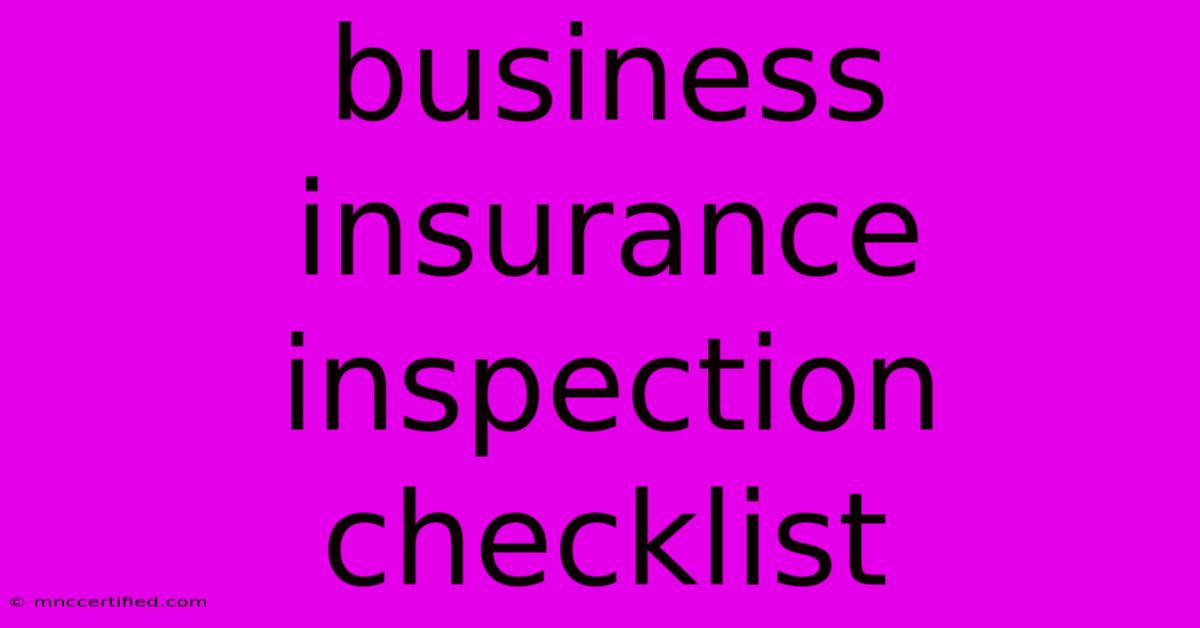Business Insurance Inspection Checklist

Table of Contents
Business Insurance Inspection Checklist: A Guide to Protecting Your Assets
Owning a business involves managing a wide range of risks. To safeguard your investment and ensure peace of mind, business insurance is crucial. But how can you be sure your insurance coverage adequately protects your assets? A comprehensive business insurance inspection checklist is your roadmap to ensuring you're adequately covered.
Why is a Business Insurance Inspection Checklist Important?
Regularly reviewing your business insurance policy and practices is crucial for several reasons:
- Identify Gaps in Coverage: A thorough inspection can reveal overlooked areas or potential shortcomings in your current insurance plan.
- Reduce Risk: By identifying potential hazards and implementing preventive measures, you can mitigate potential risks and minimize insurance claims.
- Optimize Costs: Ensuring your insurance aligns with your current needs can prevent overpaying for unnecessary coverage and potentially save you money.
- Stay Compliant: Meeting regulatory requirements and staying up-to-date on industry best practices is essential for minimizing legal risks.
Key Areas to Include in Your Business Insurance Inspection Checklist
Here's a breakdown of essential areas to examine during your business insurance inspection:
1. Property Insurance:
- Coverage: Confirm your policy covers the full replacement value of your buildings, inventory, equipment, and other assets.
- Deductibles: Review your deductibles and ensure they are manageable in case of a claim.
- Exclusions: Carefully examine exclusions, such as coverage limitations for certain types of damage or events.
- Inventory Tracking: Ensure you have accurate records of all business assets and their values.
2. Liability Insurance:
- General Liability: Assess coverage for bodily injury, property damage, and other potential liabilities to third parties.
- Product Liability: If applicable, confirm coverage for injuries or damages caused by your products.
- Professional Liability: If your business provides professional services, check if you have adequate coverage for errors and omissions.
- Coverage Limits: Ensure your liability limits are sufficient to protect your business from significant financial losses.
3. Workers' Compensation Insurance:
- State Requirements: Verify that you meet all state requirements for workers' compensation coverage.
- Coverage: Confirm that your policy covers medical expenses, lost wages, and disability benefits for employees injured on the job.
- Exclusions: Review any limitations or exclusions in your workers' compensation policy.
4. Business Interruption Insurance:
- Coverage: Confirm your policy covers lost income and operating expenses if your business is forced to shut down due to an insured event.
- Waiting Period: Review the waiting period before coverage kicks in and ensure it aligns with your business's recovery timeframe.
- Loss of Income: Determine the period for which lost income is covered and whether it meets your needs.
5. Other Essential Coverage:
- Cybersecurity: Protect your business from cyberattacks with appropriate insurance coverage for data breaches, ransomware attacks, and other digital threats.
- Flood and Earthquake: If you operate in a high-risk area, consider adding specific coverage for these natural disasters.
- Employment Practices Liability: Ensure you have insurance protection against claims related to employment practices, such as discrimination, harassment, or wrongful termination.
Best Practices for Conducting a Business Insurance Inspection
- Review Your Policy Regularly: Conduct a comprehensive inspection at least annually, or more frequently if significant changes occur in your business.
- Seek Expert Guidance: Consult with a qualified insurance broker or agent for personalized advice and assistance in reviewing your coverage.
- Document Findings: Keep detailed notes of your inspection findings, including any coverage gaps, recommended changes, and action items.
- Stay Informed: Regularly update yourself on industry trends, regulations, and changes in your business environment that could impact your insurance needs.
By following these steps and incorporating the key areas outlined above, you can create a comprehensive business insurance inspection checklist that effectively protects your assets, minimizes risks, and ensures peace of mind for your business.

Thank you for visiting our website wich cover about Business Insurance Inspection Checklist. We hope the information provided has been useful to you. Feel free to contact us if you have any questions or need further assistance. See you next time and dont miss to bookmark.
Featured Posts
-
How Much Is No Proof Of Insurance Ticket
Nov 08, 2024
-
Cheap Dentist In Las Vegas No Insurance
Nov 08, 2024
-
Will Insurance Cover A 30 Year Old Roof
Nov 08, 2024
-
Transguard Insurance Company Of America
Nov 08, 2024
-
Universal Insurance Company Charlotte Nc
Nov 08, 2024